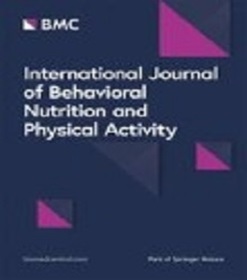测量 0-5 岁儿童 24 小时运动行为的快速评估工具的可靠性和有效性:婴儿运动行为问卷 (MBQ-B) 和儿童运动行为问卷 (MBQ-C)
IF 5.6
1区 医学
Q1 NUTRITION & DIETETICS
International Journal of Behavioral Nutrition and Physical Activity
Pub Date : 2024-04-23
DOI:10.1186/s12966-024-01596-5
引用次数: 0
摘要
开发经过验证的 "适用 "快速评估工具来测量 0-5 岁儿童的 24 小时运动行为是研究的当务之急。本研究评估了婴儿运动行为问卷(MBQ-B)和儿童运动行为问卷(MBQ-C)开放式和封闭式版本的重复测试可靠性和并发有效性。300 个亲子二人组完成了为期 10 天的研究方案(MBQ-B:85 人;MBQ-C:215 人)。为评估有效性,儿童在非惯用腕部佩戴加速度计(ActiGraph GT3X+)7 天,父母分别在两天内完成 2 × 24 小时时间使用日记(TUD),记录屏幕时间和睡眠时间。对于婴儿(即尚未学会走路的婴儿),父母在 7 天监测期的第 2 天和第 5 天填写 2 × 24 小时时间使用日记,记录腹部时间、主动玩耍时间、约束时间、屏幕时间和睡眠时间。为了评估重测可靠性,家长被随机分配在第 7 天和第 10 天完成开放式或封闭式的 MBQ。使用广义线性混合模型计算测试-再测的类内相关系数(ICC),并通过斯皮尔曼相关性评估其有效性。MBQ-B 的重测可靠性从良好到极佳,开放式和封闭式版本的 ICC 分别为 0.80 至 0.94 和 0.71 至 0.93。在这两个版本中,24 小时日记与 MBQ-B 报告的腹部时间、主动玩耍时间、限制时间、屏幕时间和睡眠时间之间存在明显的正相关(rho = 0.39-0.87)。MBQ-C 的重测可靠性为中等至优秀,开放式和封闭式版本的 ICC 分别为 0.68 至 0.98 和 0.44 至 0.97。在开放式和封闭式版本中,24 小时日记与 MBQ-C 报告的屏幕时间和睡眠时间(rho = 0.44-0.86)之间,以及 MBQ-C 报告的与设备测量的总活动时间和精力充沛的游戏时间(rho = 0.27-0.42)之间均存在显著的正相关。MBQ-B和MBQ-C是评估婴幼儿和学龄前儿童24小时运动行为的有效、可靠的快速评估工具。MBQ的开放式和封闭式版本都适用于以政策和实践为目的的研究,包括对早期肥胖预防计划的评估。本文章由计算机程序翻译,如有差异,请以英文原文为准。
Reliability and validity of rapid assessment tools for measuring 24-hour movement behaviours in children aged 0–5 years: the Movement Behaviour Questionnaire Baby (MBQ-B) and child (MBQ-C)
The development of validated “fit-for-purpose” rapid assessment tools to measure 24-hour movement behaviours in children aged 0–5 years is a research priority. This study evaluated the test-retest reliability and concurrent validity of the open-ended and closed-ended versions of the Movement Behaviour Questionnaire for baby (MBQ-B) and child (MBQ-C). 300 parent-child dyads completed the 10-day study protocol (MBQ-B: N = 85; MBQ-C: N = 215). To assess validity, children wore an accelerometer on the non-dominant wrist (ActiGraph GT3X+) for 7 days and parents completed 2 × 24-hour time use diaries (TUDs) recording screen time and sleep on two separate days. For babies (i.e., not yet walking), parents completed 2 × 24-hour TUDs recording tummy time, active play, restrained time, screen time, and sleep on days 2 and 5 of the 7-day monitoring period. To assess test-retest reliability, parents were randomised to complete either the open- or closed-ended versions of the MBQ on day 7 and on day 10. Test-retest intraclass correlation coefficients (ICC’s) were calculated using generalized linear mixed models and validity was assessed via Spearman correlations. Test-retest reliability for the MBQ-B was good to excellent with ICC’s ranging from 0.80 to 0.94 and 0.71–0.93 for the open- and closed-ended versions, respectively. For both versions, significant positive correlations were observed between 24-hour diary and MBQ-B reported tummy time, active play, restrained time, screen time, and sleep (rho = 0.39–0.87). Test-retest reliability for the MBQ-C was moderate to excellent with ICC’s ranging from 0.68 to 0.98 and 0.44–0.97 for the open- and closed-ended versions, respectively. For both the open- and closed-ended versions, significant positive correlations were observed between 24-hour diary and MBQ-C reported screen time and sleep (rho = 0.44–0.86); and between MBQ-C reported and device-measured time in total activity and energetic play (rho = 0.27–0.42). The MBQ-B and MBQ-C are valid and reliable rapid assessment tools for assessing 24-hour movement behaviours in infants, toddlers, and pre-schoolers. Both the open- and closed-ended versions of the MBQ are suitable for research conducted for policy and practice purposes, including the evaluation of scaled-up early obesity prevention programs.
求助全文
通过发布文献求助,成功后即可免费获取论文全文。
去求助
来源期刊
CiteScore
13.80
自引率
3.40%
发文量
138
审稿时长
4-8 weeks
期刊介绍:
International Journal of Behavioral Nutrition and Physical Activity (IJBNPA) is an open access, peer-reviewed journal offering high quality articles, rapid publication and wide diffusion in the public domain.
IJBNPA is devoted to furthering the understanding of the behavioral aspects of diet and physical activity and is unique in its inclusion of multiple levels of analysis, including populations, groups and individuals and its inclusion of epidemiology, and behavioral, theoretical and measurement research areas.

 求助内容:
求助内容: 应助结果提醒方式:
应助结果提醒方式:


